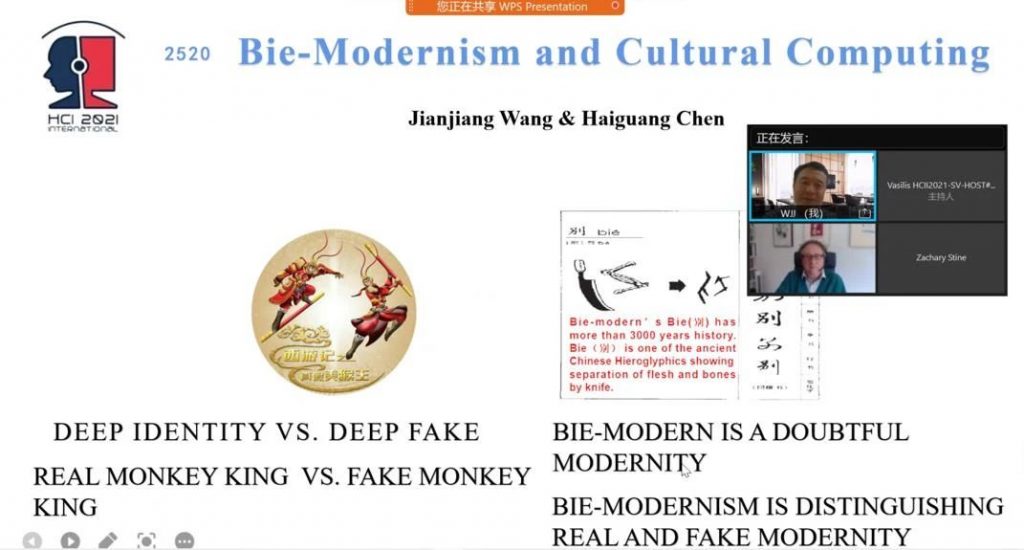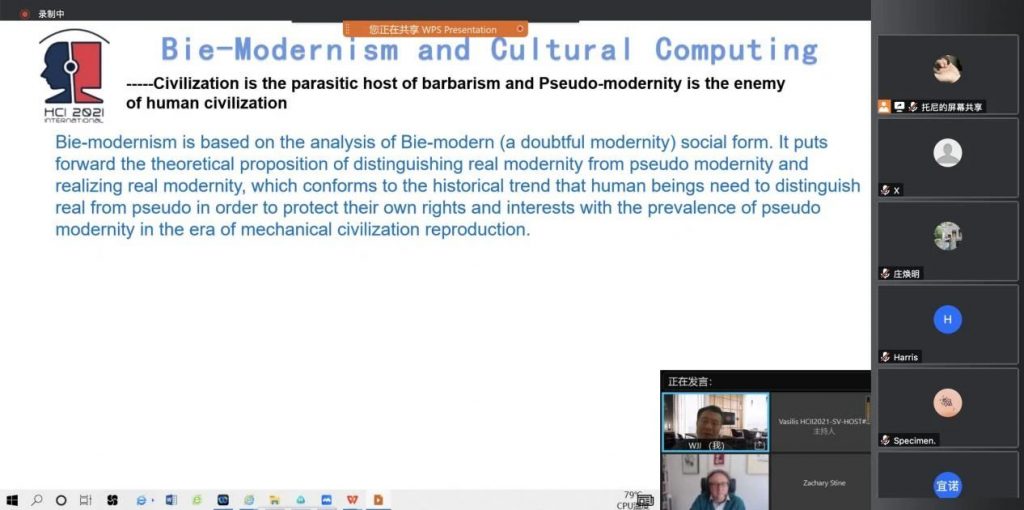The 23rd International Conference on Human-Computer Interaction (HCII2021) was successfully held online
On July 24-29, 2021, the 23rd International Conference on Human-Computer Interaction (HCII2021) was successfully held online. The conference has a wide range of topics, and the speeches of thousands of people are subdivided into 299 sub-venues according to different themes. In the special session of “Culture and Computing” at 10:30 p.m. on July 28, the founder of Bie-modernism Theory, the academic consultant of the CCBMS in the United States, and a member of the Organizing Committee of the 23rd International Conference on Human-Computer Interaction, Professor Wang Jianjiang from the School of Humanities of Shanghai Normal University, doctoral supervisor and Professor Chen Haiguang from the Department of Computer Science of Shanghai Normal University were invited to give a report on “Bie-Modernism and Cultural Computing”. The group meeting was co-chaired by Prof. Matthias Rauterberg from Eindhoven University of Technology in the Netherlands and Prof. Vasilis from the United States. Several well-known international computer scholars attended the meeting to speak and interact. This session was broadcast simultaneously through the YouTube channel in the United States and the Tencent conference in China.
In the article, Wang Jianjiang and Chen Haiguang combined doctrine with algorithms, aesthetics and computer science, and focused on the theoretical issues of deep and false, trying to develop in the field of human-computer interaction and cultural computing. The new model of philosophy + technology + art formed by cultural computing in recent years just formed an interface with the creative space theory of Bie-modernism, bringing a novel and original visual feast to the participants.
Wang Jianjiang first pointed out that with the rapid development of human civilization, barbarism will gain unprecedented opportunities with the help of pseudo-modernity, and pseudo-modernity is becoming the great enemy of human civilization. Pseudo-modernity is not only manifested in social forms, but also in artificial intelligence and computing culture, where the consequences of deep fake technology are hindering the overall improvement of human civilization. In contrast, Bie-modernism, which aims at distinguishing between true and false modernity, advocates restoring a real world through deep identification technology.
Next, he pointed out that Bie-modernism can use cultural computing to identify true and false modernity, and firstly used “Journey to the West” as an example to identify characters in static text. The Word2vec model + CNN algorithm model is used to obtain the personality scores of the main characters, and the multi-dimensional polarization analysis of the characters is realized. And then conducted a deep identification analysis of the real and fake Monkey King. Finally, referring to the difference between the original meaning and the extended meaning of “Bie” in Biemodern, as well as the difference between “doubt” and “suspect”, use algorithms to arrange, compare and calculate the various vectors of true and false modernity. From this, several key points for distinguishing between true and false modernity were determined, the difference between true and false modernity was highlighted, and the project task was completed.
At the end of the speech, Wang Jianjiang used a metaphor to humorously say that although the computer algorithm is constantly updated, it is still a new attempt to use it to identify the true and false modernity, just like driving an old car and embarking on a new road.
Co-host Professor Vaslis spoke highly of Professor Wang Jianjiang’s speech, and then raised questions after Wang Jianjiang’s speech:1.Where is Bie-modernism cultural computing heading? Which direction to choose? What will be the result? Wang Jianjiang replied that the cultural calculation of modernism comes from the needs of social reality, and then enters into social reality to solve social problems. The result will help reduce the threat of pseudo-modernity and promote the establishment of modernity and the realization of modernization in the third world. 2.What is the theoretical origin of the idea of using cultural computing to identify true and false modernity? Wang Jianjiang responded that the cultural calculation of distinguishing authenticity is based on the consideration of the current global social situation, rather than applying Western modernity theories. The theory of Bie-modernism is an original theory, which does not necessarily inherit the existing Western theories. However, as some Western philosophers have said, it is closer to the reality of their country and can better solve the problems of the country.
The host, Prof. Matthias Rauterberg, intends to compare and connect the speeches of several other well-known scholars at the conference with Prof. Wang Jianjiang’s speeches. The high-frequency words used by Wang Jianjiang, such as “别(Bie)” and “pseudo”, lead the discussion in depth, and the atmosphere is very lively. With the help of this speech, the theory of Bie-modernism, which has had an international influence, amplifies the two key words “deep fake” and “deep identification”, which has attracted the attention of scholars in the computer field and the organizing committee of the conference. It is reported that Wang Jianjiang has received an email notification that his proposal of “Deep Fake-Deep identification” has been selected as one of the main topics of the conference by the Organizing Committee of the World Cultural Computing Conference to be held in Gothenburg, Sweden in 2022. And, he was re-elected as a member of the 24th HCII Organizing Committee.





